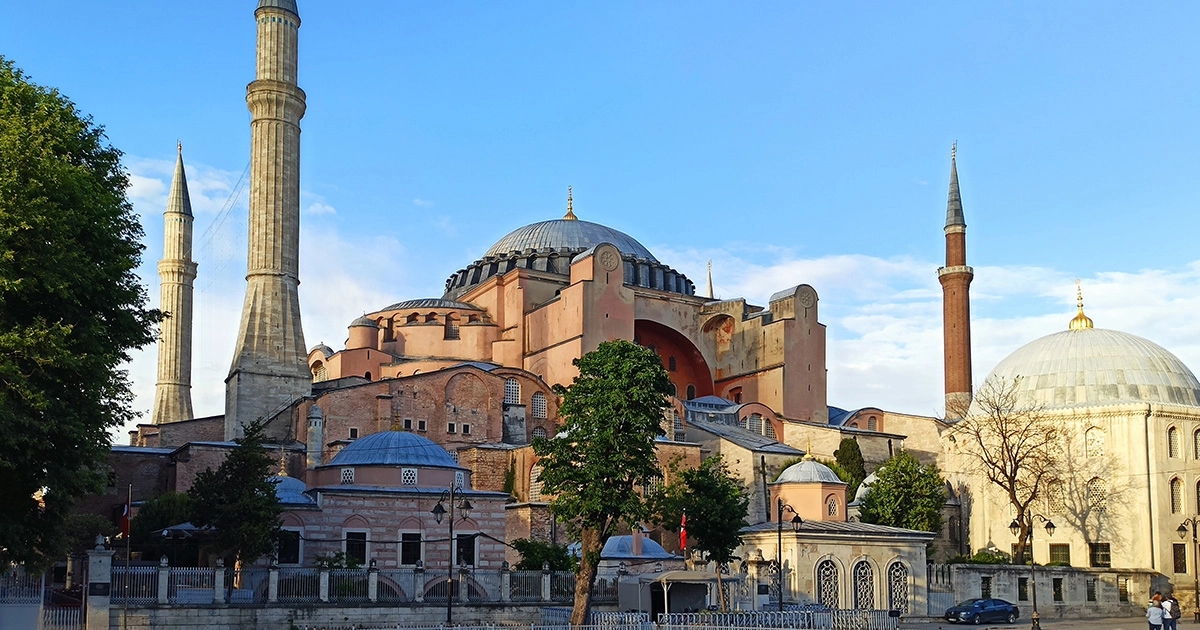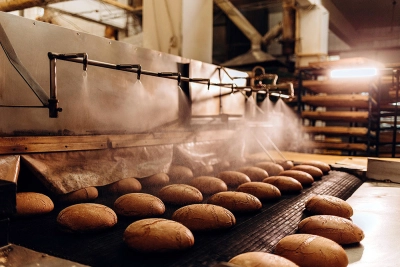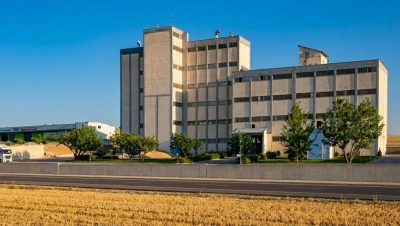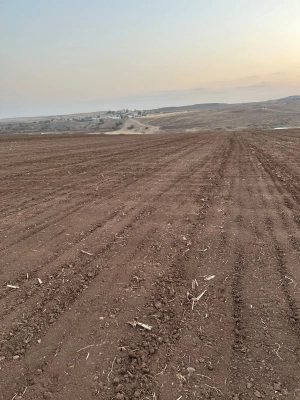Turkiye
 Table of contents
Table of contents
Turkiye grew out of the once formidable Ottoman Empire, which deployed its possessions in the richest cultural and historical region at the junction of European and Asian civilizations. The state is located in Western Asia and partly in South-Eastern Europe. Turkiye is also one of the most popular tourist destinations. She is oriental cordial and hospitable in all respects. In addition, it is an industrial country with a dynamically developing economy.
General information
The official name of the state is the Republic of Turkiye. In 2022 this country officially changed its name in English from Turkey to Turkiye.
Total area 783,562 sq. km. The population is 76 million people. The official language is Turkish. The capital of Turkiye is Ankara. In addition to her, the largest cities: Istanbul, Izmir, Bursa, Adana, Antalya, Konya. Geographically, Turkiye is divided into 81 provinces, which are subdivided into districts. There are about 1000 of them in total. There is also an informal division into 7 regions: Aegean, Black Sea, Mediterranean, Central Anatolia, Eastern Anatolia, Marmara, Southeast Anatolia.
The time zone of Turkiye is UTC +3, the time coincides with the Moscow summer and winter. Turkiye is a secular state and freedom of religion is enshrined in the country, but the majority professes Islam. Turkiye is one of the most attractive tourist destinations for several reasons. Warm sea, high service in hotels, all-inclusive system, numerous ancient sights, inexpensive shopping. In the winter season, a ski holiday in Turkiye is possible, while it will cost less than in Europe. Currency — Turkish lira.
History, geography, culture, mentality
The first mention of the Turkic peoples falls on the 4th century. In 1299 the Ottoman Empire was formed. By the 17th century, it had reached such power that it owned the territories of the Middle East, North Africa, the Balkan Peninsula and the lands of Europe adjacent to it from the north. Modern Turkiye was formed in 1923 as a result of the collapse of the Ottoman Empire after its defeat in the First World War and the subsequent national liberation war of the Turkish people, the abolition of the monarchy. Turkiye remained neutral throughout most of World War II. The concept of statehood immediately after the end of the war was radically revised, and the Republican People's Party undertook a serious commitment to reform aimed at reducing the authoritarian regime and introducing democratic freedoms. According to the five-year development plan, prepared in 1945, the economy was financed through foreign investment.
The main part of the territory of Turkiye is occupied by the peninsula of Asia Minor. The European possessions of Turkiye are called Rumelia. The geographical feature of Turkiye is its location at the crossroads of important routes that since ancient times have connected Europe with Asia, the Black Sea countries and peoples with the Mediterranean. Nowadays, highways and railway lines run through the territory of Turkiye, connecting Europe with many Asian countries. The maximum length of Turkish territory from west to east is 1600 km, from north to south — 600 km. It has common borders: in the east with Georgia, Armenia, Azerbaijan and Iran, in the west with Greece and Bulgaria, in the south with Iraq and Syria. It is washed by the Black, Mediterranean, Aegean and Marmara Seas. Turkiye is a mostly mountainous country, so the climate often has altitudinal zonality.
Turkish culture is famous for its cuisine, music and dance. The date of religious holidays is constantly shifting, as the Turks regulate them according to the lunar calendar. Among the many religious events, there are two main holidays. These are Ramadan, which falls on the sacred ninth month, and Eid al-Adha, the feast of sacrifice. Today, Turkiye is making every effort to be a modern country, but at the same time preserve religious and historical values.
Distinctive features of ethnic Turks are adherence to family values, love for football and the country's first president, Mustafa Ataturk, and pronounced emotionality. The Turks, for the most part, are hospitable and very polite people, paying special attention to etiquette. They are always ready to help a stranger, and even a tourist, but if he shows sincere respect for him. Turks especially love those who speak at least a couple of phrases in Turkish or are aware of their traditions. Politeness is preserved in everything and even in the bazaars, where it is customary to bargain without a hint of irritation.
Power
Turkiye is a unitary state. The constitution was adopted in 1982. The form of government is a mixed republic. The head of Turkiye is the president, elected by popular vote for a period of 5 years with the possibility of re-election for another term. The conservative Justice and Development Party is in power. The legislature is the Grand National Assembly, which is re-elected every 4 years. Executive power is vested in the Ministerial Council headed by the Chief Minister.
Turkiye is an important regional player and pursues an independent and independent policy from the West, despite the fact that it is part of some Euro-Atlantic organizations. It is trying to form around itself a vast zone of influence, economic and political cooperation, excluding problems on its borders and in neighboring regions. In recent years, Turkiye has acquired great economic potential and is striving to become the leader of the former Ottoman space. It has been a member of NATO since 1952, the Council of Europe since 1949, and an official candidate for EU membership since 1999.
Economy
Turkiye has a developing market economy. Economists and political scientists often classify Turkiye as a newly industrialized country. Over the past 20 years, there have been significant changes in the financial and social aspects of the Turkish economy, such as an increase in employment and average income since 2000. Favorable position on the world map, diversified structure, influx of foreign funds and cheap labor — all this has a positive effect on economic performance, thanks to which the country is on the list of developed countries.
Almost 25% of the world's mercury reserves are mined in Turkiye. Significant deposits of tungsten are located here, and the number of copper deposits reaches hundreds. Sulfur, saltpeter, table salt, chromites, bauxites, brown coal, asbestos, and phosphates are also mined in Turkiye. In general, the republic is an agro-industrial state.
The leading role in the country's economic sphere is played by the service sector, including communications, tourism and transport. Turkiye's budget is also formed by production and industry, agriculture. In the manufacturing sector, the largest contribution is made by construction and the manufacturing industry — 84%. The state receives good profits from the chemical, textile, leather, food, pharmaceutical sectors, as well as from shipbuilding, energy, metallurgy, automotive and electrical goods.
In the early 2000s, the Turkish energy industry went through several stages of liberalization, structuring and privatization. Today, electricity in the country is produced using fossil resources: natural gas, coal, hydroelectric power plants, wind generators.
Business climate
In Turkiye, not only the weather climate is favorable, but also the investment one. According to the Investment Office under the President of Turkiye, over the past year, the volume of foreign direct investment has grown by almost 80% and in absolute terms amounted to $14.1 billion. This is the highest result since 2016. For comparison: the most developed EU countries over the past year were able to increase investment by only 30%.
Turkiye is the gateway to the Middle East market with over 1.3 billion people and US$26 trillion in trade within a four-hour flight. Therefore, due to its strategic location, modern logistics infrastructure and extensive production potential, this country is a center of attraction for international investment.
Investors are primarily attracted by the rapid development of the economy. Last year, GDP grew by 11%, which significantly outpaces the growth of GDP in European countries and comes out on top in the ranking of the G20 countries.
“With these results, Turkiye has once again proved its resilience to crises and shocks, and also demonstrated that it is a safe haven with strong economic foundations,” the Turkish Presidential Investment Office commented.
Investment climate
At the moment, Turkiye has launched a foreign direct investment strategy for 2021-2023. It is aimed at stimulating the inflow of investments into science-intensive industries, mechanical engineering, medicine, the chemical industry, infrastructure development and other sectors of the economy.
Over the past five years, we have witnessed a boom in the real estate market, a lot of investment activity and a huge number of foreign businessmen to buy property in Turkiye. So Istanbul, with its European and Asian parts in particular, is considered one of the most active real estate markets in the country.
The tourism facilities available in various Turkish areas form a solid basis for building a group of the most well-known types of tourism investments.
The high quality of Turkish products and the well-known brands that are produced in Turkish factories are very popular with merchants in many countries around the world, so the idea of import and export seems to be one of the brightest business ideas. investment and one of the most successful investment and trading businesses in Turkiye.
Investments in agriculture in Turkiye bring useful financial returns if they are based on scientific evidence studied by specialists and experts in the agricultural sector, where there are many benefits that make investing in agriculture one of the most important emerging investments.
Business and investment support structures
There are several structures important for business in Turkiye. For example, the OECD Istanbul Center for Private Sector Development. It is a platform for cooperation between the OECD and emerging economies in the field of private sector development policymaking. Also in Turkiye, a business infrastructure support system for SMEs has been introduced and is operating, although it is, in principle, aimed at the manufacturing sector. This includes the Small and Medium Enterprise Development Organization (KOSGEB), the Technology Development Foundation of Turkiye (TTGV), the Turkish Science and Technology Research Council (TUBITAK), the Credit Guarantee Fund (KGF), the Chambers of Commerce and Industry, and the People's Bank (Halk Bank).
Membership of the enterprise in the Chamber of Commerce is obligatory. The formation of a company and its registration are formalized through the Chamber of Commerce. Every city in Turkiye has a chamber of commerce and industry. Business companies and industrial enterprises are represented in the chamber through professional committees for individual sectors. There is also the National Union of Chambers of Commerce and Industry, Maritime Trade and Commodity Exchanges.
The purpose of the general investment promotion program of Turkiye is to stimulate, support and orient investments in accordance with international obligations, objectives of Development Plans and Annual Programs. They serve to eliminate regional disparities within the country, create new opportunities in the Turkish labor market, take advantage of progressive and legitimate technologies with greater added value, and to support international competitiveness.
At the moment, Turkiye has adopted a set of measures specifically designed to stimulate investment. An individual entrepreneur (IE) or a legal entity can conduct business in Turkiye.
The relatively simple regulation of companies in terms of legislation and accounting, the absence of the need to prove the origin of funds and the constant growth of the economy contribute to the fact that every year more and more foreigners register their enterprises in Turkiye. In addition, investments in the economy and real estate of the country allow you to obtain Turkish citizenship.
Also, investors are waiting for exemption from customs and other payments on imported goods, which is possible in many cases. 100% exemption from customs duties is usually granted if the investment is secured with an investment incentive certificate.

Tags:


274,672,500 ₽

3,936,914,400 ₽


 New artıcles
New artıcles

 REAB Services
REAB Services
 News
News
 Useful tip
Useful tip

